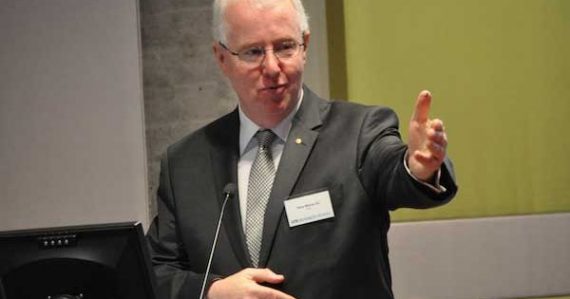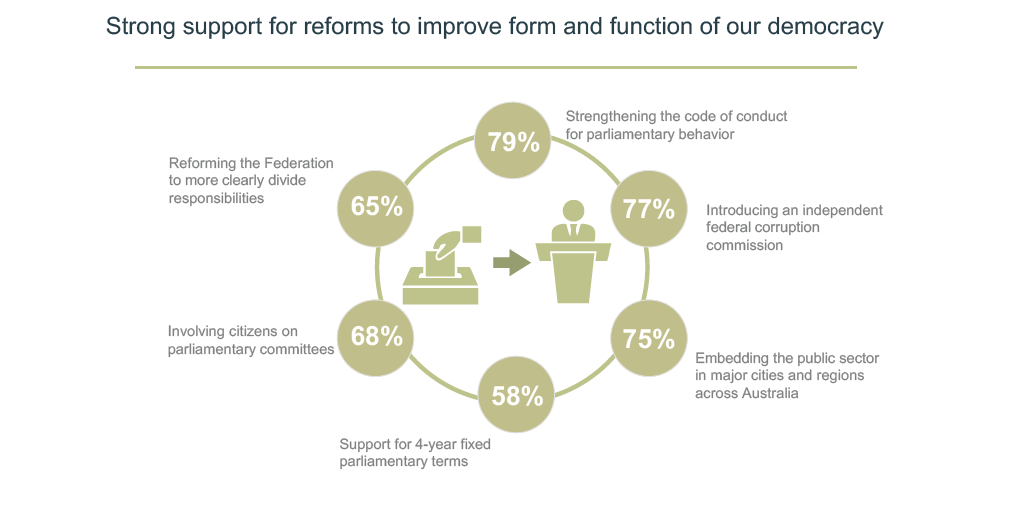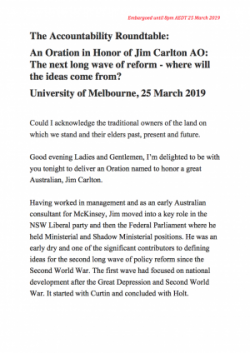In my view, a big problem is the absence of agreement on the big ideas to drive the next long wave of policy reform designed around an Australia which citizens aspire to live in.

CPD Chairperson Terry Moran AC
CPD Chairperson Terry Moran AC delivered the Jim Carlton Integrity Lecture 2019 on ‘The next long wave of reform — where will the ideas come from?’ at the Accountability Roundtable in Melbourne on 25 March. In his address, Terry laid out how he views the next wave of reform and the key steps he thinks must be taken as part of David Thodey’s review of the Australian Public Service. The speech was timely given David Thodey’s speech in Canberra last week.
Terry drew on CPD’s attitudes research over the past two years about the public’s view of Australia’s democracy. The results suggest that, to a varying extent, institutions, big ideas and delivery are now weak reflections of the axis of our democratic system – the views and expectations Australians have of their democracy.

Results from CPD’s 2017 attitudes research.
Terry drew on the ‘missions mindset’ described by Mariana Mazzucato on her Australian tour in December 2018. He shared his concern about the absence of agreement on the big ideas to drive the next long wave of policy reform designed around an Australia which citizens aspire to live in. His view is Australians want government to seek tailored, smart, creative solutions that draw on the experience of civil society, business and the public. They want missions and moonshots, such as:
- Decarbonizing our economy;
- Equipping our workforce and businesses with the capabilities to succeed in the new digital era;
- Finding a new configuration of national security and diplomatic relationships for Australia as China and the United States struggle for dominance in our region;
- A new emphasis on successful integration of new national, ethnic and religious communities into an Australia which has dropped the ball on settlement;
- Empowering indigenous communities and embracing the Uluru Statement from the Heart;
- An approach to national economic development which emphasizes goals of national competitiveness, regional integration and a fuller embrace of the region and its peoples in all their diversity; and
- Subsidiarity, driven by a respect for individuals, families and communities seeking to find comfort and support in local connection within new approaches to governance and service delivery.
The starting point for Australian missions, Terry argued, is to reinvest in the creative elements of our public services, enriched by direct experience of the services that Australians expect government to provide. He expressed his hope that local approaches are backed and our obsession with the contracted state ends because of David Thodey’s review of the Australian Public Service.
Just as the APS was rebuilt for previous reform waves, Terry argued it would need to be rebuilt once more for the next set of missions. He underlined five proposals necessary to support the future of the APS:
- To return to a public service able to provide frank advice to Ministers while securing continuity in our system of Government, including security of tenure for the most senior public servants;
- For a stronger Public Service Commission (PSC), which brings together many of the functions scattered when the Public Service Board was abolished, to be legislated;
- To formalise the role of Ministerial Advisers to make them accountable for their actions, able to be summoned before Parliamentary Committees and investigated by integrity agencies;
- For an Integrity Commission with a broad brief to investigate maladministration, deficiency in policy advice and incompetence in program management; and
- For an overhaul of laws governing political donations and the early release of information about donations.
He concluded his speech stating all of us have a responsibility to advocate for a debate about the next wave of big ideas — the missions we can all support.
Terry Moran AC has had an extraordinary career in public administration and is Chancellor of Federation University, Chair of the Centre for Policy Development, Chair of the Barangaroo Delivery Authority and Chair of the Melbourne Theatre Company. He served as Director-General of Education in Queensland 1998-2000, Secretary of the Department of Premier and Cabinet in Victoria 2000-08 and Secretary of the Commonwealth Department of Prime Minister and Cabinet 2008-11.
Media coverage
The next long wave of reform — where will the ideas come from?, Terry Moran AC, The Mandarin, 25 March 2019
Bring ministers’ advisers under greater scrutiny: ex-PM&C chief, Doug Dingwall, The Canberra Times, 26 March 2019
Mornings with Jon Faine, ABC Radio Melbourne, 26 March 2019




